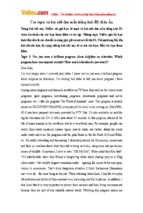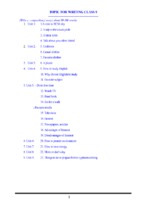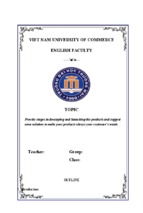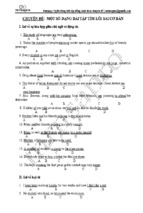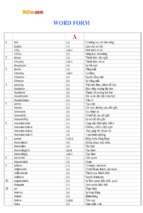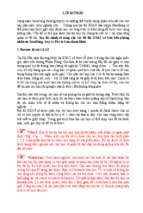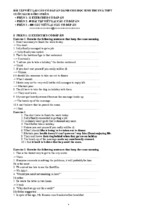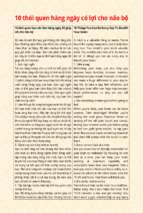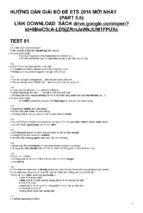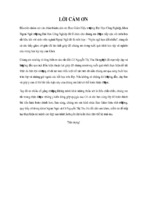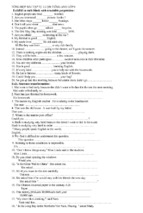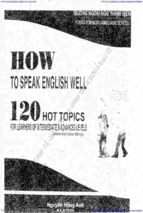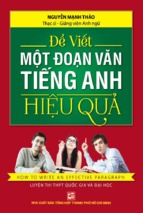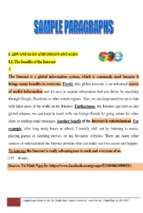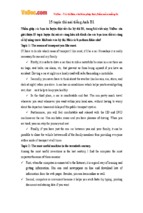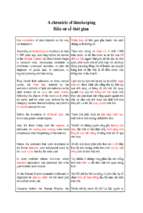239. NEIGHBOURS GOOD AND BAD
LAÙNG GIEÀNG TOÁT VAØ XAÁU
Wherever we stay we are bound to have neighbours. They are the people who live
nearby. Unless we go and live in the desert or deep in the jungle we will always find
them near. Come to think of it there are also neighbours in deserts and jungles but they
may not be of the human kind.
My family and I live in Happy Garden, a neighbourhood of terrace houses and a few
rows of shops. Our house is somewhere in the middle of this housing estate so we are
surrounded by other houses. Some of the neighbours are wonderful while some are
horrible. Yet there are others who simply prefer not to know the others.
Right next to my house on the left is a family consisting of a young couple and their
three young children. The parents earn a living selling vegetables in the night market. In
the morning they go out collecting vegetables from the farms. Come afternoon they will
be busy cleaning and sorting the vegetables for sale in the night. They are an industrious
lot. The little ones, the youngest is about four, help their parents in their chores. We are
grateful they live next oor for they are helpful and kind people. We regularly get
vegetables from them at reduced price and sometimes for nothing at all. In turn we keep
an eye on their house whenever they are away on business, which is practically every
night.
The other next door neighbour is a retired teacher and his wife. Their children have all
grown up and left the nest. They are left pretty much on their own. In the ten or so years
that they have been our neighbours we hardlly know them. I would say they are aloof.1
We tried to be friendly with them when they first moved in, but our efforts were of no
avail. They simply nod their heads in reply or just ignore us completely. Now we leave
them alone. That seems to be the way they want things to be. They have erected2 an
invisible wall between us and them. The other neighbours also have the same
experience with them. So this ex-teacher and his wife live like hermits3 in the midst of
so many people.
Further down the road is the noisiest family in the whole of Happy Garden. Their radio
is on almost 24 hours a day at a hardly tolerable volume. Fortunately we are a good five
houses from them, so the noise is not too bad. The people nearer to them either enjoy
the loud music or they have become deaf to the noise. Whatever it is no one seems to
complain about it. Perhaps it is because of the man of the house is a huge burly-fellow
who drives a tanket for a living.
Opposite us on the other side of the road is another wonderful family. The salesman
father is usually away on business. So the wife looks after their two children and the
kids come over to my house often to play with our toys. They are not much younger than
me so we get along very well. The wife often brings food for us to eat. She is a great
cook. The biscuits and cakes she makes are especially delicious and we always
welcome her to our house. The salesman's mother also live with them. She is a gentle
old woman now in her late sixties. She normally sits on a rattan4 chair just outside her
front door and watches us play.
The other neighbours are generally good people. I would say that our neighbourhood is
free of bad habits and troublesome people. I have never seen any arguments between
neighbours. Anytime any difficulty arises we seem to be able to settle it before the
situation gets out of hand.5 For example, there was a man who started bringing home
his huge lorry. For a time we had to bear the noise of the diesel engine early in the
morning and late in the night. Then someone must have made a complaint to this man
and soon he never brought the lorry back again. So we have peace except for the fellow
with his loud radio. However that is tolerable.
On the whole I suppose most of the people living here adopt a live-and-let-live attitude.
We do not make trouble for each other. Some are very friendly but some are not so.
However we do not have any hostile6 neighbour. That is something to be thankful for.
1. aloof /6'lu:f/ (adj) hôø höõng, laõnh ñaïm
2. erect /1'rekt/ (v) döïng leân, thieát laäp
3. hermit /'h3:m1t/ (n) ngöôøi soáng aån daät, aån só
4. rattan /r%'t%n/ (n) thaân caây maây duøng ñeå ñan soït, baøn gheá, v.v…
5. out of hand (idm) khoâng kieåm soaùt ñöôïc
6. hostile /'h4sta1l/ (adj) thuø nghòch caêm gheùt
240. THE ILLS OF MODERN CITIES
NHÖÕNG CAÊN BEÄNH CUÛA ÑOÂ THÒ HIEÄN ÑAÏI
The most glaring ill of modern cities is that the people in it are always in a hurry.
Businesspeople, wage-earners, labourers, pedlars,1 crooks2 and assorted characters all
rush about in their activities. It is rush, rush and more rush. City foolks rush to work, rush
to get their work done, rush to have lunch and rush home. Then perhaps they rush to
have dinner or rush to a party. Finally in the early hours of the morning it is a rush to, as
they say, grab some sleep before the rush next morning.
I was in Sydney, Australia, for a visit once. As I took a leisurely stroll along the city
streets, I was amazed at how everyone seemed to be walking very quickly past me.
Even old ladies of seventy simply overtook me without any difficulty. Some younger
ones were actually running towards God knows where. To cross the busy roads,
everyone crowded near the traffic lights. The moment the lights changed to green for
the pedestrians, they took off not unlike sprinters off the blocks. That was rush indeed. I
was forced to walk quickly too, otherwise I was likely to be trampled3 on by the crowd.
No wonder modern city-dwellers suffer from all sorts of stress-related diseases. Some of
these stressed people are probably rushing towards an early grave too.
In a city like Kuala Lumpur, after the workers have gone home, the uglier side of the
city emerges. The night-spots open up attracting all sorts of people. Prostitutes,4 drug
addicts, drug pushers,5 con-men,6 thugs7 and other potentially dangerous characters
abound. The police are hard-pressed to handle them. The crime rate is always rising.
However, compared to other cities like New York, Kuala Lumpur is relatively tame. In
New York, everyone knows that it is dangerous to even go for a walk in some areas
after 5 p.m. The likelihood of getting mugged or even killed is very high. The street
gans rule and no sane person would go out to tempt them. Still robberies, murders and
all manner of human perversion continue. Certainly there is great ill in this city. This
trend of lawlessness is spreading in other cities as well and there is no indication that
things will get better.
While skyscrapers dominate the skyline in a city, one could say squatters and shanties8
dominate the baseline. In some cities, it is estimated that these shanties occupy more
than half the city space. On one side, the wealthy ones rush around in their posh cars,
while on the other side, the less fortunate ones rush around stealing them. the imbalance
of wealth is glaring and nothing is done about it. This is another ill of modern cities.
What are the remedies for these ills of modern cities ? It would seem that nobody
knows. Nobody seems to care too, which is another typical city illness. At the rate the
cities are progressing, it certainly looks like they are headed for some sort of social
disaster. Already the inner areas of some huge cities are experiencing a breakdown of
law and order. The authorities simply cannot cope. There is not much an ordinary person
can do to alleviate9 these ills. All he can do is to hope that they will go away, which
seem very unlikely.
1. pedlar /'pedl6(r)/ (n) (cuõng peddler) ngöôøi baùn haøng rong
2. crook /kr$k/ (n) keû löøa ñaûo
3. trample /'tr%mpl/ (v) giaãm ñaïp
4. prostitute /'pr4st1tju:t/ (n) gaùi ñieám
5. drug pusher /dr^9 'p^~6(r)/ (n) (cuõng pusher) ngöôøi baùn daïo ma tuùy baát hôïp phaùp
6. con-man /'k4n m%n/ (n) keû löøa ñaûo
7. thug /8^7/ (n) keû coân ñoà hung aùc
8. shanty /'~%nt1/ (n) nhaø oå chuoät, nhaø luïp xuïp toài taøn
9. alleviate /6'li:v1e1t/ (v) laøm bôùt gay go, laøm dòu
VAÊN LYÙ LUAÄN
Haàu heát moïi ngöôøi ai cuõng muoán ñöa ra nhöõng yù kieán hoaëc quan ñieåm hôïp lyù vaø ñöôïc
suy nghó caån thaän veà nhieàu vaán ñeà voán laø moái quan taâm chuû yeáu trong cuoäc soáng. YÙ
kieán hoaëc quan ñieåm thoâng minh phaûi döïa treân baèng chöùng thöïc teá vaø hôïp loâgic. Caùc yù
kieán hoaëc quan ñieåm nhö theá khoâng phaûi laø khoâng thay ñoåi ñöôïc moät caùch cöùng nhaéc,
maø neáu nhö coù ai ñoù ñöa ra laäp luaän döïa treân moät baèng chöùng hoaëc khaùi nieäm môùi meû
nhöng hôïp lyù, thì vaãn coù theå laøm cho ngöôøi ñoïc thay ñoåi ñöôïc quan ñieåm cuûa mình.
Khi bieän luaän cho moät yù kieán hoaëc quan ñieåm naøo ñoù, muïc ñích cuûa baïn laø phaûi giaûi
thích, laøm saùng toû vaø minh hoïa ñöôïc yù kieán hoaëc quan ñieåm ñoù, ñoàng thôøi tìm caùch
thuyeát phuïc ngöôøi ñoïc ñoàng yù vôùi baïn, baèng caùch söû duïng nhöõng döõ kieän, lyù leõ, ví duï,
caùc trích daãn töø nhöõng nguoàn ñaùng tin caäy, vaø caùc loaïi chöùng côù khaùc. Baïn coù theå hoûi taïi
sao laïi phaûi daãn chöùng? Neáu khoâng daãn chöùng thì ngöôøi ñoïc khoâng chaáp nhaän yù kieán
cuûa ngöôøi vieát sao? Baïn phaûi hieåu raèng, moät yù kieán ñôn thuaàn haàu nhö voâ giaù trò. Ai
cuõng coù theå coù yù kieán, nhöng neáu chæ thuaàn tuùy trình baøy yù kieán cuûa mình thì seõ khoâng
thuyeát phuïc ñöôïc ngöôøi ñoïc ñoàng thôøi vôùi mình. Ngöôøi ñoïc coù theå cho ñoù laø moät daáu
hieäu cuûa söï löôøi bieáng, thieáu hieåu bieát, hoaëc laø baïn khoâng coù khaû naêng baûo veä yù kieán
cuûa mình. Do ñoù, ñeå thuyeát phuïc ñöôïc cho duø vôùi ngöôøi ñoïc khoù tính nhaát, baïn phaûi hoã
trôï cho yù kieán cuûa mình baèng nhöõng döõ kieän thöïc teá, caùc soá lieäu thoáng keâ, kinh nghieäm
caù nhaân, ví duï cuï theå, hoaëc nhöõng thoâng tin trích daãn töø caùc nguoàn coù giaù trò, nhö laø töø
ñieån baùch khoa toaøn thö, saùch baùo, hoaëc chuyeân gia coù uy tín veà chuyeân moân. Khoâng
neân ñöa vaøo nhöõng phaùn xeùt coù tín chuû quan cuûa caù nhaân baïn, hoaëc nhöõng phaûn öùng
thieân veà tình caûm.
Ñeå taïo ñöôïc hieäu quaû khi laøm moät baøi vaên lyù luaän, baïn coù theå söû duïng moät vaøi kyõ naêng
ñöôïc aùp duïng cho theå loaïi trình baøy, nhö laø:
a. Ñeå hoã trôï cho moät yù kieán hay quan ñieåm, haõy daãn vaøo moät söï vieäc coù yù nghóa nhaèm
minh hoïa cho yù kieán hoaëc quan ñieåm ñoù.
b. Ñeå giaûi thích moät yù kieán hoaëc quan ñieåm, haõy moâ taû tieán trình thöïc hieän hoaëc toàn taïi
cuûa moät söï vieäc naøo ñoù.
c. Laøm saùng toû moät yù kieán baèng caùch xaây döïng moät ñònh nghóa hoaëc khaùi nieäm roõ raøng.
Löu yù:
1. Khi vieát moät baøi vaên lyù luaän luoân ghi nhôù raèng coâng vieäc cuûa baïn khoâng chæ laø trình
baøy vaø giaûi thích vaán ñeà ñang tranh luaän cho ngöôøi ñoïc, maø coøn phaûi thuyeát phuïc
ngöôøi ñoïc, baèng caùch söû duïng nhöõng daãn chöùng hoã trôï hieäu quaû, raèng yù kieán cuûa baïn
laø ñuùng ñaén, hôïp lyù vaø coù giaù trò.
2. Coù vaøi ñeà baøi neâu roõ theå loaïi yeâu caàu laø lyù luaän, ví duï:
a. "20th Century is an age of greed". Do you agree with this statement ?
b. "Students study just to pass the exam". Do you agree ?
Tuy nhieân, moät soá ñeà baøi khoâng theå hieän roõ reät yeâu caàu veà theå loaïi. Do ñoù, deã gaây ra
söï laãn loän giöõa hai theå loaïi trình baøy vaø lyù luaän.
a. Write about the job you think is most suitable for women
b. The life of a modern country undoubtedly depends on oil
c. Which two inventions have benefited your own country most.
(Suy nghó cuûa baïn coù theå khaùc vôùi suy nghó cuûa ngöôøi khaùc. Do ñoù baïn phaûi tìm caùch
thuyeát phuïc hoï raèng hai phaùt minh maø baïn ñaõ choïn laø hai phaùt minh quan troïng nhaát)
241. IS A LITTLE KNOWLEDGE DANGEROUS ?
KIEÁN THÖÙC HAÏN CHEÁ COÙ NGUY HIEÅM KHOÂNG?
Yes, a little knowledge is always dangerous not only to that person, but also to others.
There is certainly a great deal of truth in this statement. We may also refer to another
proverb "empty vessels make most noise".1 Knowledge is desirable and should be
attained by anyone at any cost, however a little knowledge, which may be slightly better
than no knowledge, can be dangerous.
It is normal to see people with little knowledge trying to make others believe that they
are very knowledgeable. This often makes them proud and they tend to treat others with
little respect as well as looking down upon others. Somtimes, some people might
believe them and with this "little knowledge", these people will try to lead others which
will usually end in disappointment and disaster.
Those with little education and some of a particular age and sects2 of women are such
examples. They will try to read on a variety of subjects and then try to impress others. In
employment they will think themselves to be high and mighty. They always feel that
work is below their dignity. The result is that they will be fired.3 These people woll
become dejected,4 disappointed and confused.
Some people may disagree that a little knowledge is not a dangerous thing. On the other
hand, it can motivate5 them to further their efforts to gain more knowledge. This may be
true in some cases. But psychological studies have revealed that this type of persons are
very rare.
So it is always good to know something well. Gaining knowledge in a particular field wil
definitely makes one a master in a subject. Let us not be jack of all trades and master
of none.6 Let us at least be a master of some.
1. empty vessels make most noise (idm) thuøng roãng keâu to
2. sect /sekt/ (n) giaùo phaùi nhoû, nhoùm nhoû (nhöõng ngöôøi coù cuøng nieàm tin hoaëc tö töôûng)
3. fire /fa16(r)/ (v) sa thaûi (ngöôøi laøm coâng)
4. dejected /d1'd2ekt1d/ (adj) chaùn naûn, buoàn baõ
5. motivate /'m6$t1ve1t/ (v) thuùc ñaåy, laøm ñoäng cô thuùc ñaåy
6. jack of all trades and master of none (idm) bieát nhieàu vieäc nhöng chaúng tinh thoâng
ngheà naøo
242. SHOULD THERE BE SCHOOL DURING WEEKENDS ?
COÙ NEÂN ÑI HOÏC VAØO NGAØY NGHÆ CUOÁI TUAÀN?
The weekend or holiday is a concept1 which came up with the observation of Sabbath2
as a holiday by Christians who regard it as God's Day. The idea is kept true to form and
so the weekend has come to stay with all nations and countries with the exception of the
Islamic countries. There Friday is the weekend instead of Sunday. Whatever the idea
may be, schools and other institutions observe Sunday as a holiday.
Whether there should or shouldn't be school on Sunday is a matter of opinion. Let us
first see the case for the school working on Sunday. Most of the parents may be for it.
For children at home on Sunday make life a hell for parents. They neither revise nor do
their homework. They make a lot of noise and there is no end to their homework
mischief. The parents find it difficult to concentrate on their work because children
come in the way. Hence for all these reasons, they feel that the school should work even
on Sundays.
Since education is a continuous process there need not be a Sunday. Just as our organs
work continuously, the process of education must also be continuous. The break upsets
the course since very often no useful work is down and when they come to school there
is the feeling of Monday blues.3 Rest does not mean break from work. Very few
children will be bent on any serious work during holiday. There is a lot idleness.4 Rest
period in between work is desirable rather than a day long of rest. The stiffness of the
limbs which goes with the long rest can be seen with the sitffness of learning process
after a Sunday. Hence people argue school should work even on Sunday.
But there are people who insist on the weekend because people need rest after an
arduous5 and taxing week. The rest will refresh them, and some freedom from the
frame of time tables and discipline is desirable for the young minds.
Teachers need the weekend off to do serious preparation for the coming week. They
also need some time to attend to their personal needs. They may even engage
themselves in leisure activities in which even pupils may take part.
Since parents are also having a holiday they would like to spend some time with their
children. It will help them to look into the books and notebooks of the child or perhaps
help the child to do some holiday homework. For instance, there is the weekend
washing. It may be worth-while to visit places or friends that day. Hence the weekend is
a necessity.
1. concept /'k4nsept/ (n) khaùi nieäm
2. sabbath /'s%b68/ (n) ngaøy xaba (ngaøy trong tuaàn leã daønh ñeå nghæ ngôi vaø thôø phuïng
Chuùa; ñoái vôùi ngöôøi Do Thaùi laø Thöù Baûy vaø ngöôøi Cô ñoác giaùo laø Chuû nhaät)
3. blues /blu:z/ (n) noãi buoàn hoaëc thaát voïng gheâ gôùm
4. idleness /'a1dln1s/ (n) söï nhaøn roãi
5. arduous /'@:dj$6s/ (adj) gian khoå, gay go
243. SAY WHETHER SCHOOL HOURS SHOULD BE MADE LONGER
COÙ NEÂN KEÙO DAØI THEÂM GIÔØ HOÏC ÔÛ TRÖÔØNG?
Children of today spend a lot of time in school. Besides the normal hours in class there
are also extra-mural activities, games and sports. Sometimes we spend the whole day in
school. I would say that school hours should not be made longer. If possible I would
rather we have shorter school hours.
School children have to sit in class everyday for about 6 hours. This happens five days a
week, except for holidays. Thus it is quite a strain to spend so much time trying to learn
the things that are put onto us. We have to learn mathematics, geography, history,
science, art and other subjects, one after another with hardly a break. It is not easy to
switch from one subject to another everytime the bell rings, but we do try. It is
especially difficult after a gruelling1 session in trigonometry2 to switch to the
population of North American cities. There are so many things to remember. We, as
humans, sometimes do forget.
The daily break of 20 minutes is a much welcome thing. It enables us to recover a bit
from the constant onslaught3 of information in class. But then it is back to the grind4
until school is over.
After a hard day at school we cannot look forward to any rest. There are tons of
homework to do everyday. The teachers seem to think that we are only learning the
subjects they teach. So they load us with homework, not realising that other teachers
have loaded us with their homework as well. Rarely we get an understanding teacher
who give us a minimum amount of homework. Usually we have to spend the rest of the
day at home doing our homework. Otherwise we will have to answer to the teachers for
failing to finish the homework on time.
Some days we have to return to school after normal school hours to participate in sports,
games and other activities. These are compulsory and so we spend more time in school.
These activities are interesting sometimes. Often they are not.
In short, it is evident we school children do not have much time to spend on our own.
School takes much of our time. Homework takes a huge part of the rest. If we do not
have such long school hours then we will have more time for ourselves to relax and do
the things we want. Also shorter school hours mean that we do not have to absorb so
much information. This is definitely less strain on our young minds. Furthermore we wil
have less teachers giving us homework. So we have less homework to do.
Some adults say that children have too much free time. They have come to this
conclusion because they see some kids loitering5 in shopping complexes and public
areas. What they see are only a handful of kids. The majority of us have to slog6 in
school or spend time finishing our homework. Anyway these loiterers are the ones who
just cannot cope with the pressure in school. So they simply give up and loaf around. I
cannot really blame them for school is indeed tough.7 The weaker of us cannot take it.
Long hours in school cooped up in a classroom do nothing to help the situation.
It would not be correct to say that shorter hours will make school more pleasant. I would
say that longer hours will make the situation worse. We need free time for ourselves.
We need to do the things we want. Sometimes we need to do nothing in particular. We
have to relax and take things easy. Otherwise we are likely to go mad or join the
loiterers in the shopping complexes. So I have to say to those in power : please don't
make school hours any longer. The hours are already too long.
1. gruelling /'9ru:6l17/ (adj) gay go, meät nhoaøi
2. trigonometry /tr196'n4m6tr1/ (n) löôïng giaùc hoïc
3. onslaught /'4nsl0:t/ (n) cuoäc taán coâng döõ doäi
4. grind /9ra1nd/ (n) söï coá gaéng theå chaát hoaëc tinh thaàn laâu daøi, ñeàu ñeàu, meät moûi vaø buoàn teû
5. loiter /'l01t6(r)/ (v) la caø
6. slog /sl49/ (v) mieät maøi, caëm cuïi
7. tough /t^f/ (adj) khoù khaên, khaéc nghieät
244. DO YOU THINK THAT HOMEWORK SHOULD BE ABOLISHED1 ?
BAÏN COÙ CHO RAÈNG TA NEÂN LOAÏI BOÛ BAØI TAÄP ÔÛ NHAØ KHOÂNG?
Homework is a bitter pill for many students. Teachers always give homework. They are
given to help students to revise2 what has been done in the class and also to finish a
given task set in school which the pupil could not finish on time.
Education and mastery of knowledge is a matter of skill so the more practice has the
better skill. There are skill subjects and knowledge subjects. Both these categories
require drill3 and repetition. The teacher to some extent, drills the student in the class
but in the classroom each individual student cannot be expected to do the same amount
as skills of students vary from each other.
Homework need not necessarily be repeating what has been done in the class, it may be
more study. The student goes through references and acquires more and better
knowledge. The world of knowledge is so wide that the class alone cannot bring
everything into the grasp of the student. So the student must take up some initiative4 of
his own. This is one of the purposes of homework.
The school also must see that the students are not overburdened5 with homework. The
teachers must see to it that the homework is distributed evenly throughout the week.
Still there are subjects like mathematics or transcription in the lower classes which
require daily attention. There are other aspects of school work which can be attended to
during the weekend, for example, map making and drawing diagrams.6
Simply because some boys find homeworks too much to cope up with, it cannot be
abolished. The school should provide some facilities, so that the boys can conveniently
attend to their home work and the teachers can come willingly forward to help such
boys.
1. abolish /6'b4l1~/ (v) huûy boû
2. revise /r1'va1z/ (v) oân laïi, xem laïi
3. drill /dr1l/ (v) luyeän taäp tæ mæ baèng nhöõng baøi taäp thöïc teá vaø thöôøng laëp ñi laëp laïi –(n)
baøi luyeän taäp coù tính chaát ñoù
4. initiative /1'n1~6t1v/ (n) oùc saùng kieán
5. overburden /6$v6'b3:d6n/ (v) ñeø naëng
6. diagram /'da169r%m/ (n) bieåu ñoà
245. DO YOU AGREE THAT THE STUDY OF MATHEMATICS IS ESSENTIAL1
TO THE PROGRESS OF THE HUMAN RACE ?
BAÏN COÙ ÑOÀNG YÙ RAÈNG VIEÄC NGHIEÂN CÖÙU TOAÙN HOÏC RAÁT CAÀN THIEÁT CHO
SÖÏ TIEÁN BOÄ CUÛA NHAÂN LOAÏI?
Though the study of Mathematics had occupied the attention of Egyptian and Greek
scholars centuries ago, yet it was only after the advent of the Industrial Revolution that
the importance of the subject was fully realised by scholars and educationists
everywhere. Today, Mathematics is one of the most important subjects in all the schools
and universities of the world.
Before the Industrial Revolution, men lived very simple lives. Agriculture, hunting and
fishing were then their main sources of more comfortable if they only exercised their
mental faculties a little more and organised a system of knowledge, which we now call
the Science, and applied it to practical purposes. Thus, they turned to nature for
sustenance,2 and were satisfied with what they could acquire from nature with their
skills. This simple mode of existence was, however, disturbed by the inventions of a
few men, sometime in the eighteenth century, which caused people everywhere to think
of new ways of improving their conditions of living. The inventions revealed new
sources of comfort, and power for the production of goods. Thus, the Industrial
Revolution began. More and more machines were invented for the rapid production of
goods, and the study of Mathematics began to receive great encouragement, for it was
realised that machines function on mathematical principles.
The intensive study of Mathematics revealed its potentialities.3 It was soon applied not
only to invent new machinery but also to explain abstruse4 subjects such as Physics,
Logic and many others. In fact, Mathematics is now used to teach and explain almost
every important subject in schools and universities. Even the construction of buildings
and bridges requires a deep knowledge of Mathematics.
The study of Mathematics has also helped to increase the mental powers of men. They
are not only able to think more clearly than they could before but are also able to
understand and explain many of the things which they could not understand earlier.
Sometimes, however, Mathematical principles have been applied for tragic
consequences. In battles and wars, bombs and cannon-balls5 have been released with
remarkable accuracy6 to destroy the enemy. this fact reveals how a knowledge of
Mathematics could be used to hinder7 human progress. But such a situation develops
only when men have lost their patience and their capacity for compromise8 and
fortunately the leaders of the world today are trying their utmost to remove the causes
for war.
In general, however, men have a natural impulse to live in peace and harmony with
others, and almost every invention is aimed at promoting the welfare of the peoples of
the world. Thus, the human race has benefitted from the efforts of those who have made
the fullest use of Mathematical principles for all their inventions. I therefore agree that
the study of Mathematics is eesential to the progress of the human race.
1. essential /1'sen~l/ (adj) thieát yeáu, caàn thieát
2. sustenance /'s^st1n6ns/ (n) chaát boå döôõng (cuûa thöùc aên thöùc uoáng)
3. potentiality /p6ten~1'%l6t1/ (n) tieàm naêng, tieàm löïc
4. abstruse /%b'stru:s/ (adj) khoù hieåu
5. cannon-ball /'k%n6nb0:l/ (n) traùi phaù, troïng phaùo
6. accuracy /'%kj6r6s1/ (n) söï chính xaùc
7. hinder /'h1nd6(r)/ (v) caûn trôû, ngaên chaën söï tieán boä cuûa ai / caùi gì
8. compromise /'k4mpr6ma1z/ (n) söï thoûa hieäp
246. PRIVATE TUITION - IS IT NECESSARY ?
HOÏC TÖ COÙ CAÀN THIEÁT KHOÂNG?
As far as I am concerned, I find that private tuition is not necessary for me. I shall give
some reasons.
I find that if I pay attention in class when the teacher is teaching, it is adequate to see
me through my lessons and homework. If there is any doubt I can always ask the teacher
concerned.
Today most of the things taught in school are not too difficult to follow, as long as1 I do
not neglect my work. Mathematics, Science, Geography, History, and English are not
that difficult to handle2 provided3 I take an interest in them and put in some genuine
effort. So in all my years in school I never had to have any private tuition. Yet I can get
through my examinations without any problem.
I notice that my classmates who take private tuition are usually not interested in their
studies. In class they have a "couldn't-be-bothered" attitude thinking that their tuition
teachers will cover the lessons for them later. What they do not realise is that it is so
much easier to pay attention in class than having to spend extra time in the afternoons
just to cover up for the wasted time in school. The extra time can easily be spent for
other more constructive things than having to repeat a lesson.
Also private tutors do not come cheap. The parents have to fork out4 a considerable sum
of money for the services of the tutors who are ordinary teachers anyway.
The trouble with taking private tuition is that the students can become too dependent on
the tutors and cannot function on their own. Everything has to be spoon-fed.5
Private tuition is only necessary if the child is really weak in certain subjects. But
nowadays it is trendy to go to tutorial centres or engage private tutors.
Whether private tuition does really improve the performance of an ordinary student is
debatable. Some of my classmates take private tuition. I do not see them doing
exceptionally well in tests and examinations. Some of them still fail. Those who do not
take private tuition perform just about the same as those who do. I, for one who does not
have private tuition, does not feel disadvantaged nor less capable than those who do.
I have to concede6 that not everyone has the same ability or intelligence. So some
students may really need extra tuition before they can grasp what is being taught.
Perhaps then these people can benefit from private tuition. But for the majority of
students, like my classmates, they do not need private tuition. What they need is to do
their classwork properly and they should have no troubles passing any examination.
The teachers in school are always there to help if we bother to ask them. They are
already paid for their services. So there is no need to pay them extra for the same things
they teach in school.
1. as long as (idm) vôùi ñieàu kieän laø; ñeán chöøng naøo maø
2. handle /'h%ndl/ (v) giaûi quyeát, xöû lyù
3. provided (that) /pr6'va1d1d/ (conj) mieãn laø, vôùi ñieàu kieän laø
4. fork out /f0:k a$t/ (v) traû (tieàn) moät caùch mieãn cöôõng
5. spoon-feed /'spu:n fi:d/ (v) giuùp ñôõ hoaëc daïy ai quaù nhieàu ñeán noåi khoâng coøn ñeå cho hoï
töï mình suy nghó; nhoài nheùt
6. concede /k6n'si:d/ (v) thöøa nhaän
247. STUDENTS STUDY JUST TO PASS THE EXAM. DO YOU AGREE ?
HOÏC TROØ HOÏC CHÆ COÁT ÑEÅ THI ÑAÄU THOÂI. BAÏN COÙ ÑOÀNG YÙ NHÖ THEÁ KHOÂNG ?
I agree fully with the above statement. I am a student and I study just to pass
examinations. It seems the same with my schoolmates. We are all only concerned with
examinations. We do not study other things.
The reason that we do not study other things is because we have no time for them.
School subjects take up all our time in school and much of our time out of school.
Everyday we have to learn so many things whether we like it or not. Lessons continue
one after the other with hardly a break. Our brains switch from history to geography to
mathematics to science unceasingly. We manage most of the time, but sometimes it gets
so tiring. For me, any initial interest I have in any subject is quickly killed off by the
sheer amount of information I have to absorb. No one is allowed to learn at his or her
own pace. Everyone is force-fed1 a diet of information regardless whether he or she can
cope with it or not.
Then there is always the next examination around the corner. Since very young we have
been taught this : passing an examination is good, failing is very bad. We are expected
to pass. Our parents, teachers and all grown-ups applaud us when we pass. If we fail, we
are made to feel worthless. I myself had been caned2 by my father because I got red
marks in my report card.
No one wants to be considered worthless or be punished for failure, but that is what the
world is. So we become obsessed3 with examinations. We study because we do not want
to fail. I have heard some teachers say that we should study to acquire knowledge.
Knowledge is considered something precious. It is all very well and idealistic4 to say
such things but I do not see anyone practising it. The only knowledge I acquired in my
years in school is that if I fail I am finished. I have to pass.
That is how I feel. For some of my classmates who cannot cope with the workload, they
simply give up studying. They are already marked as failures by the teachers so they
see no point in studying anymore. I do not fall in that category. I still study and do my
homework as diligently as I can, but I do these things with only one thing in mind and
that is : I have to pass my examinations.
So the students study, some of them very hard indeed. Passing means success in the
world. Failure is unspeakable. The fact remains that they study not for the sake of
knowledge but only so that they can pass the next examination. I am no different from
them.
1. force-feed /'f0:s fi:d/ (v) buoäc (ngöôøi hoaëc vaät) phaûi aên uoáng
2. cane /ke1n/ (v) tröøng phaït baèng roi voït
3. obsess /6b'ses/ (v) aùm aûnh
4. idealistic /a1d16'l1st1k/ (adj) (thuoäc chuû nghóa) lyù töôûng vaø khoâng thöïc teá
248. EDUCATION IS VERY NECESSARY. DO YOU AGREE ?
BAÏN COÙ ÑOÀNG YÙ RAÈNG GIAÙO DUÏC LAØ ÑIEÀU RAÁT CAÀN THIEÁT?
Whether or not education serves the right purpose in our society is a diffcult question to
decide. Very often people do not take up professions for which they are trained ; at
other times they do not get the opportunity to use their training. When most education at
the school level is either free or subsidised,1 it becomes essential to examine the
question in great detail.
Is education really necessary ? Did we not live before this quantitative expansion took
place, before education began to be imparted2 to members of all classes. In Britain till
mid-nineteeth century education was class privilege. Britain could expand the area of its
education on the basis of the industrial relation. Can the developing and the underdeveloped countries afford to take similar measures ?
For generations our people have depended only on life to educate them and they have
all learned through experience. Even at a higher stage of education mere theoretical
knowledge is not enough ; it has to be related to actual experience. Many young
engineers and technicians find that what they have learned in their schools and colleges
is not of much use to them and they have to learn everything anew3 once they take to
practical work.
However solid these arguments may appear to be, I firmly believe that education alone
can save us. It alone can help us build a better future. Ignorance never was bliss4 and to
believe in it would be a folly. It is not gold that makes good people or good countries. It
is knowledge. Knowledge is the only thing which can come to the help of mankind.
Education is one we cannot neglect. If we want young minds to grow and be aware of
the world around them, if we want our country to be in the forefront5 or at least on par
with6 other countries, we must educate our people for all advanced knowledge and for
peace and war education is necessary. We can never be free if we depend on other
countries for the technical know-how.7 Even if practical knowledge is acquired in the
fields and the factories, we have to have some one who knows about the soils and the
fertilizers and can build our factories.
Today war is not a mere matter of bravery of courage. Wars are won or lost on the basis
of literacy. Modern weapons are so sophisticated that an illiterate soldier cannot use
them. Education is not a mere ability to sign one's name. It is the basis of something
much more important. Even basic hygiene and cleanliness are connected with the level
of edcation. To some extent they are also connected with the economic situation.
Education helps to solve both the problems at one go. With better education better jobs
will be available.
There is no time to dilly-dally8 about matters related to education. If we want progress,
we must ensure minimum education for all.
1. subsidise /'s^bs1da1z/ (v) trôï caáp cho (ai / caùi gì)
2. impart /1mp@:t/ (v) phoå bieán
3. anew /6'nju:/ (adv) theo moät caùch môùi hoaëc khaùc; laïi moät laàn nöõa
4. bliss /bl1s/ (n) nieàm vui lôùn, haïnh phuùc troïn veïn
5. forefront /'f0:fr^nt/ (n) haøng ñaàu hoaëc vò trí quan troïng
6. on par with (sb/sth) /p@:(r)/ (idm) ngang taàm quan troïng, chaát löôïng, v.v… vôùi (ai / caùi gì)
7. know-how /'n6$ ha$/ (n) bí quyeát thöïc hieän (töùc kieán thöùc hoaëc kyõ naêng thöïc teá (traùi
vôùi lyù thuyeát) trong moät hoaït ñoäng)
8. dilly-dally /'d1l1 d%l1/ (v) laõng phí thôøi gian, daây döa
249. DO YOU THINK SCHOOL LEAVERS SHOULD GET SOME WORKING
EXPERIENCE BEFORE GOING FOR FURTHER STUDIES ?
BAÏN COÙ CHO RAÈNG HOÏC SINH TOÁT NGHIEÄP TRUNG HOÏC COÙ NEÂN ÑI LAØM ÑEÅ
COÙ THEÂM KINH NGHIEÄM TRÖÔÙC KHI HOÏC TIEÁP BAÄC ÑAÏI HOÏC KHOÂNG?
It would certainly be a good thing if school leavers get some working experience before
going for further studies. One reason is that they get a taste of what work is and thus are
in a better position to know what they want to study further.
As it is, the smarter students get channelled1 directly into universities and colleges the
moment they finish school. Most, if not all, of them do not know what the real working
world is like. When they finish their studies they are plunged into the competitive work
market often without a hint of what it is like. So they have to learn very quickly how to
cope with the sudden change. The luckier ones get jobs they like. Many get stuck in jobs
they have no inclination for and only keept at the jobs because they do not know what
else they can do.
This causes job dissatisfaction. The result are unhappy workers in unhappy companies.
However, if school leavers were to get a taste of working life first, they will soon have a
pretty good idea of what it is. They will have probably discovered too what sort of jobs
they prefer to do. With this precious knowledge, they will then know what courses to
take up to ensure they secure the right jobs on graduation.
Most of my teachers are those who went straight to university or college on finishing
school. They have virtually no experience of life outside school. So when they return to
school to teach, they are ill-equipped to teach the children what it is like outside the
school. Some teachers who had had to work outside before becoming a teacher have far
better knowledge of the outside world. The difference is obvious. I am in no way saying
that the former2 are inferior3 teachers. It is just that they would be better ones if they
have had outside experience.
As for myself, the moment I leave school, I am going to get myself a job. It does not
matter what job it is or for how long I will have it. In only want the experience of
working. Only by involving myself fully in the working world will I know what it is like
and how to cope with it. Even if it is for a few months, by that time, I will have a fairly
good idea of working life. Thus I will be in a good position to decide what I will like to
do in the future. I will not be a confused jobseeker nor an unhappy employee.
1. channel /'t~%nl/ (v) höôùng ñeán
2. the former /'f0:m6(r)/ (n) laø ñoái töôïng ñaàu tieân ñöôïc noùi ñeán giöõa hai vaät hoaëc ngöôøi (≠
the latter)
3. inferior /1n'f16r16(r)/ (adj) thaáp hôn, keùm hôn
250. "FAR TOO MUCH ATTENTION IS PAID TO EXAMINATION RESULTS
WHEN SELECTING CANDIDATES FOR EMPLOYMENT". ARGUE EITHER
FOR OR AGAINST THIS STATEMENT.
“KHI CHOÏN LÖÏA ÖÙNG CÖÛ VIEÂN CHO MOÄT COÂNG VIEÄC, NGÖÔØI TA ÑAÕ CHUÙ YÙ
QUAÙ NHIEÀU ÑEÁN KEÁT QUAÛ THI CÖÛ”. HAÕY LYÙ LUAÄN HOAËC UÛNG HOÄ HOAËC
PHAÛN ÑOÁI YÙ KIEÁN NAØY.
I feel that today it is no longer1 real merit2 which helps one in landing3 a good job ;
rather it is the grade one has secured on an examination. Not only the degrees have
multiplied over the years, but the possible areas of specialisation have also increased. A
look at the dailies is an educative experience. The various openings are for men and
women who have successfully gained a large number of qualifications. It is imperative
for one to have had a consistently bright academic record. A prospective candidate feels
he has lost the chance even before having been fairly tried because the paper
qualifications stand between him and the final interview.
It is easy enough to guess the way the employers think. They feel that anyone who has
had the courage and determination to slog for long hours has proved his capacity for
hard work. In the process, they assume, he has also proved his sense of responsibility
and reliability. Thus the candidate's seriousness of purpose stands him in good stead.4
But would it not be worthwhile to examine the other side of the case ? The person who
has slogged so hard has perhaps lost all his initiative and has not allowed his imagination
scope to develop. In order to be a good examinee one may have to wear blinkers, give
up all extra-curriculum and time-consuming activities and thus develop a lopsided5
personality. The qualities required for a good examinee do not always go to make a
good administrator or officer or technician.
Firms, employment agencies and prospective employers who attach a great deal of
importance to examination result are mistaken in their assessment6 of the examination
system. A written examination is by no means a foolproof7 test of a person's
intelligence. The syllabus8 seldom changes and in certain cases the questions tend to
follow a set pattern. The examination system, besides being subject to many vagaries,9
leads to memorising by students. On the other hand, a candidate who may not have
fared well where marks and percentage are concerned, may have a fully developed, rich
personality. Instead of selecting a few important topics he might have worked hard over
the whole syllabus; instead of memorishing, he might have understood and grasped the
course. What is more important is his involvement in extra-curriculum activities which
would have been more sincere and genuine.
The main purpose of education is to teach one how to think, how to act, to develop one's
initiative and to be able to take decisions. In fact, education equips us for facing life, for
solving and braving,10 the problems which may confront us from day to day. To link
education solely to the examination grades is to distort11 its meaning, to falsify its
essence, and to prove our own inadequacy in such matters.
Many businessmen a great acumen have had no formal training in the trade they pursue
; many able administrators may not have had much success in examinations. School
dropouts12 and delinquents13 have often risen to meet a challenge much more strongly
than successful examinees. In many a village in the East it is still possible to come
across old men and women who store the wisdom of the ages. In today's world the
educational system need not necessarily inculcate14 sound moral values, and
examinations are in no way a real test of brilliance. If I were to choose people it would
not bother me how well they have performed in the various examinations ; but my
concern would be to discover how much they know of their subject and how quick and
alert they are in their responses and the way they react to a problem. Thus the interview
should be the proper base for selection and not the grading in the examination though it
has to be conceded that the minimum grade should have been obtained.
1. no longer /'l476(r)/ (adv) khoâng coøn… nöõa
2. merit /'mer1t/ (n) phaåm chaát toát ñaùng ñöôïc khen thöôûng
3. land /l%nd/ (v) giaønh ñöôïc (moät choã laøm, moät giaûi thöôûng, v.v…)
4. stand sb in good stead /sted/ (idm) coù ích cho ai hoaëc giuùp ñôõ ai khi caàn
5. lopsided /l4p'sa1d1d/ (adj) leäch laïc
6. assessment /6'sesm6nt/ (n) söï ñaùnh giaù
7. foolproof /'fu:lpru:f/ (adj) khoâng theå cheäch höôùng hay bò hieåu laàm; raát roõ raøng vaø
ñôn giaûn
8. syllabus /'s1l6b6s/ (n) chöông trình hoïc
9. vagary /'ve196r1/ (n) söï thaát thöôøng
10. brave /bre1v/ (v) ñöông ñaàu vôùi (moät vaán ñeà, v.v…) vôùi thaùi ñoä duõng caûm
11. distort /d1'st0:t/ (v) xuyeân taïc, boùp meùo
12. dropout /'dr4pa$t/ (n) ngöôøi boû hoïc nöûa chöøng
13. deliquent /d1'l17kw6nt/ (n) ngöôøi cheånh maûng, lô laø vôùi nhieäm vuï
14. inculcate /'1nk^lke1t/ (v) khaéc saâu
- Xem thêm -


